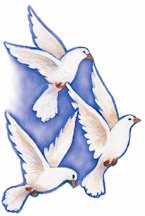-
 IT'S
VERY DANGEROUS IT'S
VERY DANGEROUS
-
By
Fr.
Ignatius L. Madya Utama,
S.J.
-
-
-
If asked
what the fruits of the Spirit are, St. Paul gives us the answer in
the Scripture. “The fruit of the Spirit is love, joy, peace,
patient endurance, kindness, generosity, faithfulness, gentleness
and
 self-control”
(Galatians 5:22-23). They are the opposites of “what
proceeds from the flesh…,” which are so destructive (read:
sinful), that St. Paul warns us sternly that “those who do
these sorts of things won’t inherit the
Kingdom
of God”
(see Galatians 5:19-21). self-control”
(Galatians 5:22-23). They are the opposites of “what
proceeds from the flesh…,” which are so destructive (read:
sinful), that St. Paul warns us sternly that “those who do
these sorts of things won’t inherit the
Kingdom
of God”
(see Galatians 5:19-21).
-
The question
is how can we “own” these fruits of the Spirit so that we will not
be controlled by our sinfulness, which can bring us to damnation?
Since their “owner” is the Holy Spirit, there is only one way to
“own” them; that is, asking the Holy Spirit to grant (some of)
them to us. But I have to tell you this. If we ask God –the
Spirit– seriously, there is a chance that our request will
be granted. If that happens, it is very risky! What do I mean?
-
In October
1994, two months before I offered my final vows as a Jesuit in the
Philippines, I experienced a very piercing loneliness. Whatever I
need as a Jesuit, I already had: academic degree, “career,”
ministries, friends, good relationship with parents and siblings.
But why this kind of loneliness?
-
I was so
shocked to discover in my prayers that my loneliness stems from
the fact that since I left Indonesia on August 20, 1986, I never
lived and worked with and for the poor; the poor who helped me
learn to become a good Christian and a Jesuit priest.
-
So I asked
God to grant me courage to look for the poor and to minister to
them. Several friends prayed for me as well. After six months of
praying, I had the answer. The time came for me to go to the De
la Strada Parish, a slum area in Barrio Kaingin
(Philippines), with a Jesuit friend. There were many small
children with runny noses, human and bestial excrements, and
garbage everywhere.
-
I almost
vomited and asked myself: “Is this the kind of life I am looking
for?” People there gathered to celebrate the Eucharist in a
basketball court because they had not finished building their
chapel yet. I shared my experiences with some friends and asked
them to pray more so that I will have the courage to return to
that barrio.
-
The
following Sunday, I went there again to preside at the Eucharist.
Just before reading the Gospel, the rain poured down. Some people
rushed to protect me and the altar from the rain by holding
umbrellas. The rest remained standing under the rain, many
without umbrellas, until the end of the Eucharist. This very
memorable experience made me go there every Sunday for more than
three years. I also attended some of their meetings to prepare
for their rallies or their defense for their cases in court.
I even joined their rallies. I also invited them to come to my
Jesuit community at the Ateneo de Manila University campus (which
they never dared to enter before).
-
Working with
them, ministering to them, and learning from them rekindled my
faith and drove away my emptiness and loneliness. I became more
sensitive and respectful for the poor, and more generous in
sharing what I have especially with those who are in need.
-
I returned
to Indonesia on August 8, 2000. Now, aside from being a fulltime
professor of Theology, I spend some of my time and part of my life
to journey with battered women. I have the courage to do it
because of my experience working at Barrio Kaingin,
which was the result of my prayers.
-
Having read
the above sharing, do you still have courage to ask God to grant
you His gifts, knowing that if granted, they can really challenge
your way of thinking and your way of living? Asking God to grant
us His Spirit’s gifts is asking Him to lead our life with
His Spirit. And letting God’s Spirit lead our life means letting
our whole self be possessed by the Spirit of God, to be vivified,
guided, inspired, and fulfilled in it. And as we are
“overshadowed” by the Spirit, our whole being is offered for God’s
dynamic liberating action in history, to preach the good news to
the poor, to proclaim release to the captives, to set liberty to
those who are oppressed.
Very dangerous indeed!
-
-
See Ruben Habito, “Spirituality: Attuning to the Breath of
God,” in Asia’s Gift to a Total Christian Spirituality
(Manila: Zen Center for Oriental Spirituality in the
Philippines, 1988), p. 7, as quoted by Mary John Mananzan,
“Redefining Religious Commitment in the Philippine Context,”
in We Dare to Dream. Doing Theology as Asian Women,
edited by Virginia Fabella and Sun Ai Lee Park (Maryknoll, NY:
1989), p. 112. See also Lk 4: 18-19.
-
-
|
